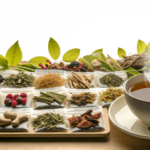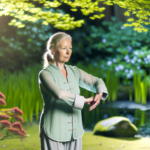Dong Quai and Its Historical Use
Dong Quai, known scientifically as Angelica sinensis, is a perennial plant native to China. Revered for over a thousand years in traditional Chinese medicine, Dong Quai has been called the “female ginseng” due to its use in treating women’s reproductive issues. Historically, it has been utilized to manage menstrual cramps, regulate menstrual cycles, and alleviate menopausal symptoms. The root of the plant is the primary part used for its medicinal properties, often prepared as a decoction or tincture.
The Role of Dong Quai in Traditional Chinese Medicine
In Traditional Chinese Medicine (TCM), Dong Quai is considered a blood tonic, believed to nourish and invigorate the blood. It is often prescribed in combination with other herbs to create a synergistic effect for treating various conditions. TCM practitioners have used Dong Quai to address ailments ranging from anemia and hypertension to chronic pain and constipation, highlighting its role as a versatile component of herbal medicine.
Current Popularity and Forms of Consumption
Today, Dong Quai continues to be a popular herbal remedy worldwide. Its adoption in Western herbalism has led to a variety of consumption methods, including capsules, liquid extracts, and topical preparations. Despite its widespread use, scientific research on Dong Quai is still evolving, with studies investigating its efficacy and safety. As a result, it is essential for consumers to consult healthcare professionals before incorporating Dong Quai into their health regimen, especially those with specific health conditions or those taking other medications.
Botanical Profile
Taxonomy and Plant Characteristics
Angelica sinensis, commonly known as Dong Quai or Chinese angelica, is a perennial herb belonging to the family Apiaceae. It is closely related to other well-known plants such as parsley, carrots, and celery. The taxonomy of Dong Quai is as follows:
- Kingdom: Plantae
- Clade: Angiosperms
- Clade: Eudicots
- Order: Apiales
- Family: Apiaceae
- Genus: Angelica
- Species: A. sinensis
Dong Quai is characterized by its umbrella-shaped clusters of white flowers and fragrant, greenish-white roots. The plant can grow up to 1 meter in height and is distinguished by its smooth, purplish stems and bipinnate leaves with wide leaflets.
Habitat and Cultivation
Angelica sinensis is native to China, where it thrives in cool, high altitude regions with moist soils. It is commonly found in the mountainous Gansu, Hubei, and Sichuan provinces. Cultivation of Dong Quai requires specific conditions, including well-drained, slightly acidic soil and partial shade. The roots are typically harvested from plants that are at least three years old, as older plants are believed to have higher concentrations of active compounds.
Active Compounds and Their Properties
Dong Quai’s medicinal properties are attributed to its rich array of bioactive compounds. These include:
- Phthalides: Notably ligustilide, which is believed to contribute to the herb’s anti-inflammatory and muscle-relaxing effects.
- Coumarins: Such as ferulic acid, which may have antispasmodic and vasodilatory properties.
- Polysaccharides: These complex carbohydrates are thought to have immunomodulatory activities.
These compounds are thought to work synergistically to produce Dong Quai’s therapeutic effects. The herb’s estrogenic activity, often discussed in relation to menopausal symptom relief, is a subject of ongoing research, with some studies suggesting that certain extracts may bind to estrogen receptors.
It is important to note that while Dong Quai is rich in these active compounds, the exact concentration can vary depending on factors such as the age of the plant, the time of harvest, and the method of extraction used. Therefore, standardization of Dong Quai supplements is crucial for ensuring consistency and efficacy.
Health Benefits of Dong Quai
Bone Health and Menopause
Dong Quai, known as the “female ginseng,” is traditionally believed to have beneficial effects on bone health, particularly during menopause. Menopause can lead to a decrease in estrogen levels, which may result in bone density loss. While scientific evidence is limited, some studies suggest that the phytoestrogens in Dong Quai may help to mitigate this loss by mimicking the effects of estrogen in the body.
Blood Sugar Regulation
Regulating blood sugar is crucial for overall health, and Dong Quai may play a role in this process. Although research is in the early stages, there is some indication that the herb can influence blood sugar levels and insulin resistance, potentially offering support for those managing diabetes or pre-diabetic conditions.
Cardiovascular Health
The potential cardiovascular benefits of Dong Quai are of significant interest. Components such as ferulic acid may help to reduce blood clotting and improve circulation. This could be particularly beneficial for individuals with heart conditions or high blood pressure, though more research is needed to confirm these effects.
Anti-inflammatory Effects
Chronic inflammation is a root cause of many diseases, and Dong Quai is believed to possess anti-inflammatory properties. This could make it a valuable herbal remedy for conditions associated with inflammation, such as arthritis. However, clinical evidence supporting this use is still emerging.
Menopause Symptom Relief
One of the most common uses of Dong Quai is for the relief of menopause symptoms, such as hot flashes and mood swings. Although some studies have not found a significant difference in symptom relief compared to placebo, many women report subjective improvement in their menopausal symptoms when using Dong Quai.
Potential Antidepressant Effects
Mood disorders, including depression, can sometimes be exacerbated during menopause. Dong Quai is thought to have mood-stabilizing effects, potentially acting as a natural antidepressant. While promising, this area of Dong Quai’s health benefits requires more rigorous scientific validation.
In conclusion, Dong Quai has been traditionally used for a variety of health benefits, particularly related to women’s health and menopause. While anecdotal evidence and preliminary research are encouraging, further well-designed studies are necessary to fully understand the extent of Dong Quai’s therapeutic effects and to establish standardized guidelines for its use.
Scientific Research and Evidence
Studies on Bone Density and Menopause
Research on the effects of Dong Quai on bone density and menopause has yielded mixed results. Some studies suggest that the phytoestrogens in Dong Quai may have a beneficial impact on bone health, particularly in postmenopausal women who are at increased risk of osteoporosis. However, the evidence is not conclusive. For instance, a study published in Phytotherapy Research found that a standardized extract of Angelica sinensis exhibited estrogenic activity, which could potentially influence bone density positively. Yet, more rigorous clinical trials are needed to establish Dong Quai’s efficacy and safety for bone health during menopause.
Research on Blood Sugar and Insulin Resistance
There is some evidence to suggest that Dong Quai may have a role in blood sugar regulation and insulin resistance. Animal studies have shown that certain compounds in Dong Quai, such as polysaccharides, can improve insulin sensitivity and reduce blood sugar levels. However, human studies are limited, and more research is necessary to determine whether Dong Quai can be a reliable treatment for blood sugar regulation in humans.
Investigations into Cardiovascular Benefits
Cardiovascular health is another area where Dong Quai has been investigated. Some studies indicate that Dong Quai may have protective effects on the heart, possibly due to its anti-inflammatory and antioxidant properties. For example, research published in International Journal of Biological Macromolecules highlighted the immunomodulatory activity of Dong Quai polysaccharides, which could potentially benefit cardiovascular health. However, these findings are preliminary, and well-designed clinical studies are needed to confirm these benefits.
Analysis of Anti-inflammatory Properties
The anti-inflammatory effects of Dong Quai have been analyzed in various studies. Compounds such as ferulic acid found in Dong Quai are thought to contribute to its anti-inflammatory action. Research in Inflammopharmacology demonstrated that polysaccharides from Angelica sinensis had protective effects against ulcerative colitis in rats, suggesting potential anti-inflammatory benefits. Nonetheless, human studies are required to validate these findings.
Clinical Trials on Menopause and Mood Disorders
Clinical trials have been conducted to assess the effectiveness of Dong Quai in relieving menopause symptoms and mood disorders. Some trials suggest that Dong Quai may help alleviate hot flashes and improve overall well-being in menopausal women. However, the results are not consistent across studies. For instance, a randomized double-blind placebo-controlled trial published in the Canadian Urological Association Journal found no significant difference in the treatment of hot flashes for men on androgen deprivation therapy. This indicates that while Dong Quai is popular for menopausal symptom relief, its actual clinical efficacy may be limited and requires further investigation.

THEN IT CONTAINS TOXIC CHEMICALS. WHY RISK IT GETTING SICK? GO CHEMICAL FREE.
Usage and Dosage
Traditional Preparation Methods
In traditional Chinese medicine, Dong Quai is often prepared as a decoction. The root of the plant is typically sliced, dried, and then simmered in boiling water for a specific period, allowing the active compounds to be extracted into the liquid. This method of preparation is believed to release the herb’s essential oils and potent compounds, such as ferulic acid and ligustilide, which contribute to its therapeutic effects.
Modern Supplement Forms and Availability
Today, Dong Quai is widely available in various forms, including capsules, tablets, tinctures, and powders. These supplements are often found in health food stores, online marketplaces, and pharmacies. The convenience of these modern forms has contributed to Dong Quai’s popularity in Western herbal medicine, allowing for easier consumption and dosage standardization.
Recommended Dosages and Administration
The recommended dosage of Dong Quai can vary depending on the form of the supplement and the specific health concern being addressed. For instance, capsule dosages may range from 500 mg to 2000 mg per day, while tinctures might be administered in smaller quantities of 1 to 2 milliliters, taken two to three times daily. It is crucial for individuals to follow the manufacturer’s instructions or consult with a healthcare professional to determine the appropriate dosage for their needs.
Combination with Other Herbs
Dong Quai is often used in combination with other herbs to enhance its efficacy and target specific health issues. In traditional practices, it may be blended with herbs like peony, astragalus, or licorice root to create a synergistic effect that balances the body’s systems. When combining Dong Quai with other herbs, it is essential to understand the interactions and complementary actions of each herb to ensure safety and effectiveness.
Note: While Dong Quai is considered safe for most individuals when used in recommended amounts, it is important to consult with a healthcare provider before starting any new supplement regimen, especially for those with pre-existing health conditions or those taking other medications.

From unhappy, dry, and sandpaper to silky, smooth and feeling good. That’s Cleo. Cleo is a 100% natural labial balm to moisture and soothe “your other lips”. Cleo is chemical-free, water-free, pH optimized and helps maintain and restore your delicate labial skin’s natural flora. Ideal for daily use or as needed. Get the most silky, lovable lips ever.
Safety and Side Effects
Interactions with Medications
Dong Quai is known to contain compounds that can affect the body’s blood clotting mechanisms. As such, it can interact with anticoagulant and antiplatelet medications, potentially increasing the risk of bleeding. Medications such as warfarin, aspirin, and clopidogrel should be used with caution when taking Dong Quai. Additionally, because Dong Quai may have estrogen-like effects, it could potentially interfere with hormone therapies, including birth control pills and hormone replacement therapy. It is imperative that individuals consult with healthcare providers before combining Dong Quai with any medications.
Contraindications and Precautions
Individuals with certain health conditions should exercise caution with Dong Quai. Those with hormone-sensitive conditions such as breast, uterine, or ovarian cancers, endometriosis, or uterine fibroids should avoid Dong Quai due to its potential estrogenic activity. People with bleeding disorders or those preparing for surgery should also refrain from using Dong Quai, as it may exacerbate bleeding risks. It is not recommended for use during pregnancy due to possible uterine stimulant effects, which could lead to miscarriage.
Possible Allergic Reactions
Like any herbal supplement, Dong Quai can cause allergic reactions in some individuals. Signs of an allergic reaction may include rash, hives, itching, swelling, and difficulty breathing. Those with allergies to other members of the Apiaceae or Umbelliferae family, which includes carrots, celery, and parsley, may be at a higher risk for an allergic reaction to Dong Quai. Immediate medical attention should be sought if an allergic reaction is suspected.
Recognizing and Managing Adverse Effects
While Dong Quai is generally considered safe when used as directed, some individuals may experience adverse effects such as gastrointestinal discomfort, photosensitivity, or fatigue. Photosensitivity, in particular, can lead to skin inflammation under sun exposure. To manage these effects, it is recommended to start with lower doses to assess tolerance, avoid prolonged sun exposure, and discontinue use if severe side effects occur. Monitoring by a healthcare provider is advisable, especially for individuals taking other medications or with pre-existing health conditions.
Conclusion and Final Thoughts
Summary of Dong Quai’s Potential Health Benefits
Dong Quai, known as Angelica sinensis, has been traditionally celebrated as the “female ginseng” for its purported benefits in managing menopause symptoms. Its historical use in Traditional Chinese Medicine and its current popularity in supplement form stem from its potential to offer relief from common menopausal discomforts such as hot flashes, mood swings, and bone density concerns. The active compounds in Dong Quai, including ferulic acid, are believed to contribute to its anti-inflammatory effects and possible influence on blood circulation and cardiovascular health.
Considerations for Use in Menopause and Beyond
While Dong Quai is embraced by many for its potential to ease menopausal symptoms, it is essential to approach its use with informed caution. Women considering Dong Quai should consult healthcare professionals, particularly due to the herb’s potential interactions with medications and contraindications in certain health conditions. The importance of quality sourcing cannot be overstated, as the FDA does not regulate herbal supplements, and the risk of impurities or contaminants is a valid concern.
Future Research Directions
The scientific community acknowledges the need for more rigorous, well-designed clinical trials to substantiate the therapeutic claims of Dong Quai. Future research should aim to clarify the efficacy of Dong Quai in symptom relief, understand its pharmacological mechanisms, and establish standardized dosages for optimal benefit. Investigations into the long-term safety profile of Dong Quai will also be crucial in validating its use for menopausal support.
In conclusion, Dong Quai holds a revered place in herbal medicine for women’s health, particularly in the context of menopause. Its potential health benefits, combined with a rich historical backdrop, make it a compelling option for those seeking natural symptom management. However, the journey to fully understand and integrate Dong Quai into menopause care is ongoing, necessitating further research, open dialogue between women and healthcare providers, and a cautious, personalized approach to its use.











